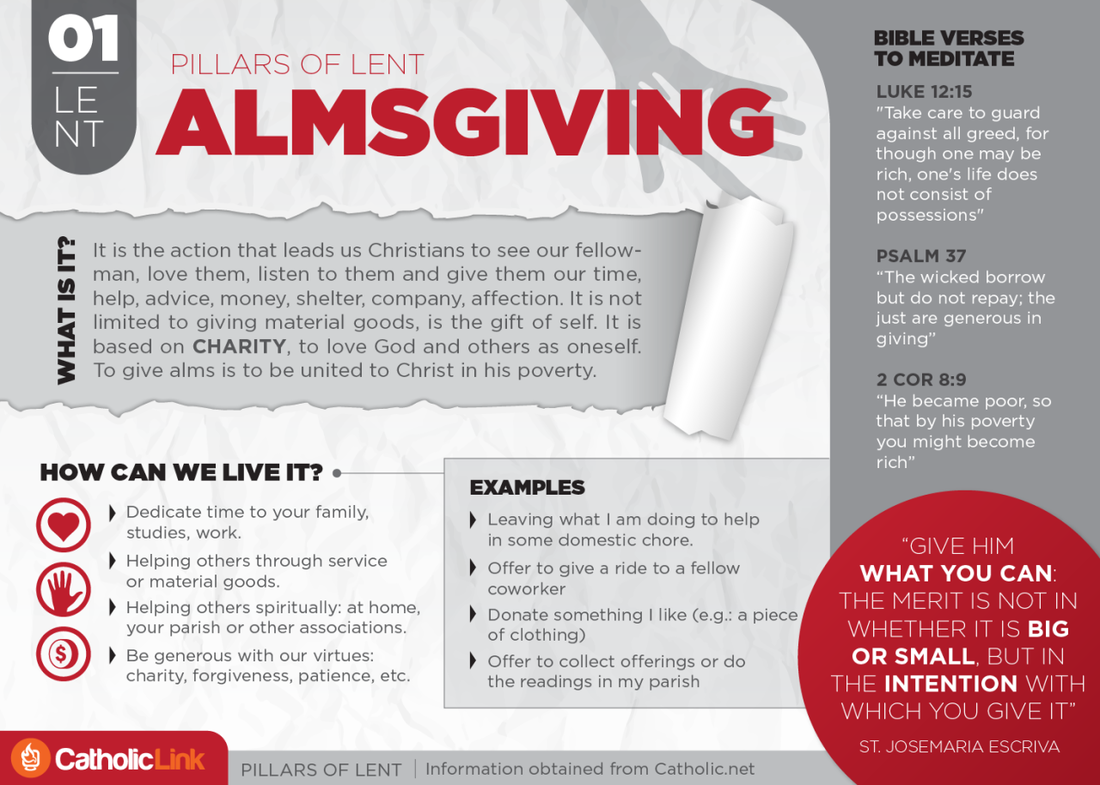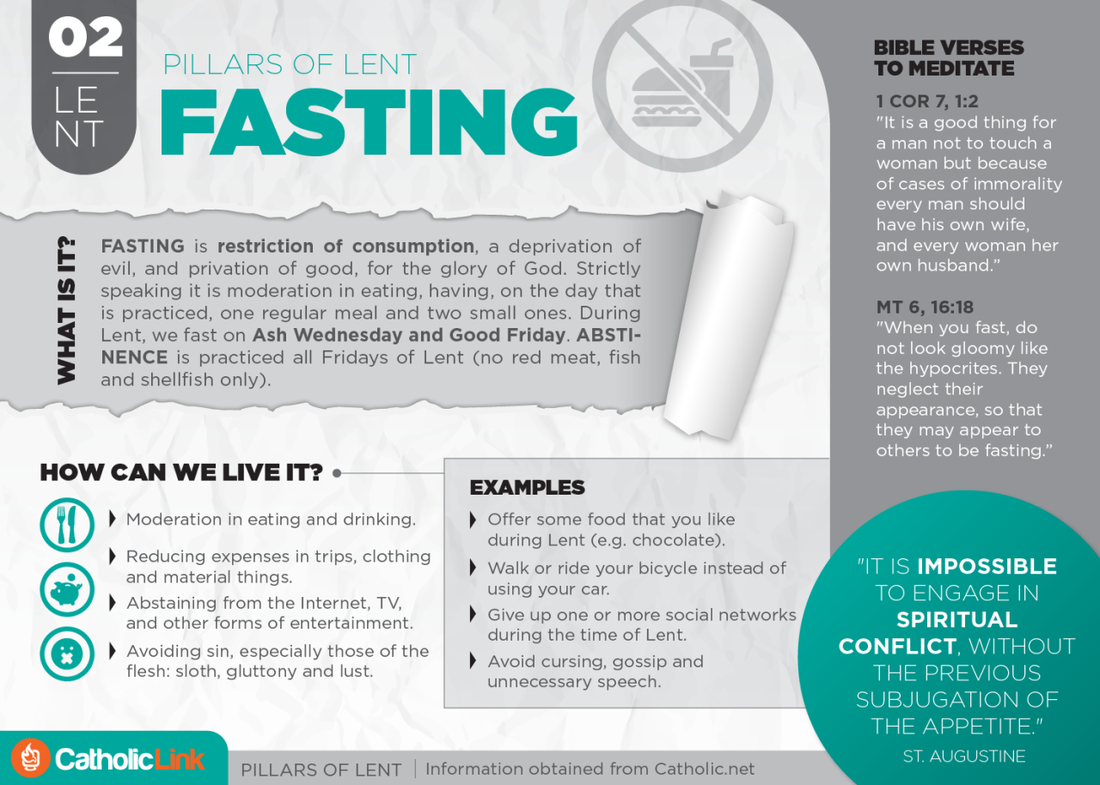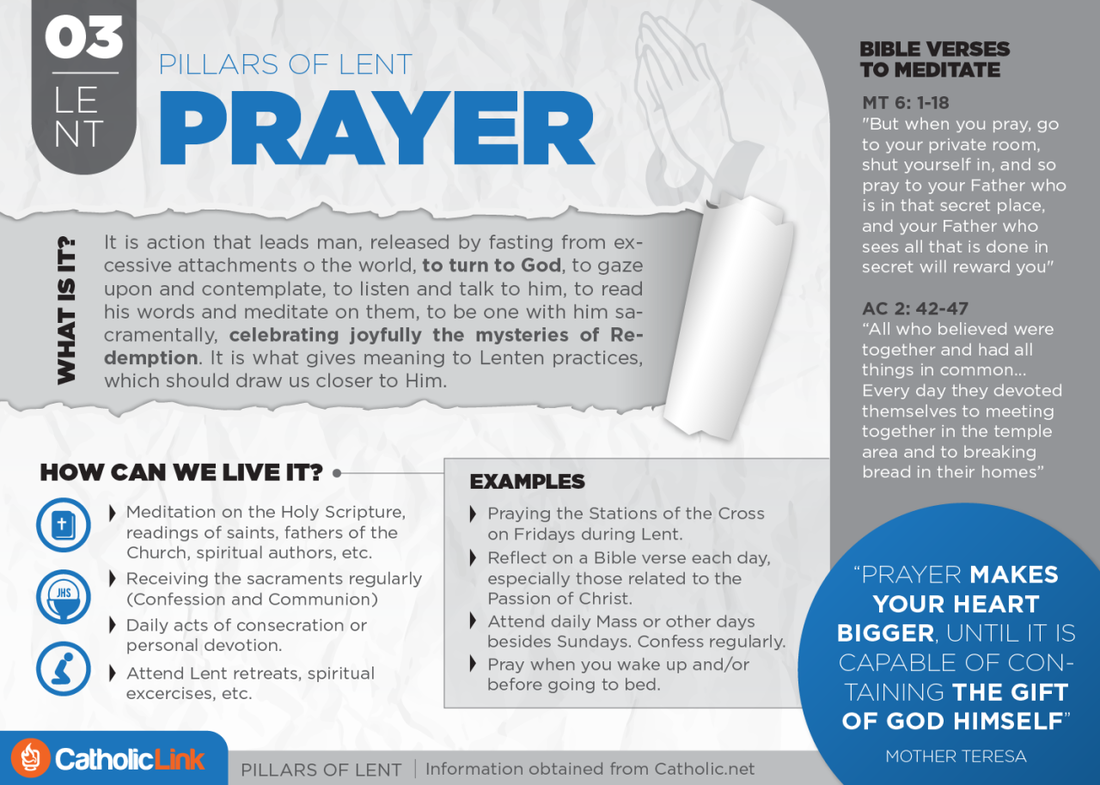|
2/27/2017 0 Comments Living Lent wellWhat is Lent?
Lent is the liturgical season of forty days which begins with Ash Wednesday and ends with the celebration of the Paschal Mystery (Easter Triduum). Lent is the primary penitential season in the Church’s liturgical year, reflecting the forty days Jesus spent in the desert in fasting and prayer (CCC, Glossary, Lent, p. 886). Through the season of Lent, the Church unites herself each year to the mystery of Jesus in the desert. As the letter to the Hebrews (4:15) points out, “[W]e have not a high priest who is unable to sympathize with our weaknesses, but one who in every respect has been tested as we are, yet without sinning.” Throughout this holy season the Church’s liturgy re-reads the great events of salvation history leading up to THE saving event: the passion, death, and resurrection of Jesus (the Paschal Mystery). Our entrance into the Paschal Mystery is the sacrament of baptism. This forty days is preparation for the catechumens who will enter the life of the Church through baptism at the Easter Vigil. It is also a time for each of us to renew and unlock the gift of our own baptism. Baptism, like all of the Sacraments, directs or orients us to the source and summit of the faith, the Holy Sacrifice of the Mass, the Eucharist. The Holy Sacrifice of the Mass is the Paschal Mystery of Jesus re-presented (made present) for us in time. How do I live Lent well? Jesus and therefore the Church holds out to us three biblical practices for living Lent well: prayer, fasting, and almsgiving. Prayer is about loving God, fasting is about loving yourself, and almsgiving is about loving others. Lent, therefore, is all about love. Prayer is simply the raising of the heart and mind to God. Prayer is seeking friendship and union with God. It can be exercised in many forms - meditation, contemplation, conversation, thanksgiving, praise, intercession, etc. Whatever helps us to lift our hearts and minds to God is good prayer. Here are some ideas and resources on prayer. Fasting is the practice of abstaining partially or wholly from food and drink as an expression of interior penance. It is a powerful spiritual and biblical practice. We fast in order to discipline our bodily appetites. Fasting helps us to learn and practice self-mastery. We can also fast from other things in our lives - social media, looking at my phone every two minutes, Netflix, TV in general, etc. This world is a non-stop cacophony of stimulation and we need to take advantage of this holy season and regain control over what we consume - from food to media. Fasting or disciplining our desires opens up in us the call of the deepest desire of my heart; the desire for God. This desire can be drowned out at times by the more immediate and tempting desires of the flesh, the world, and the devil. Fasting gives us back our direction and aim - God Himself. Almsgiving is about letting God use me to bless others. You could give money, or your time, or your talents to others or in service to others. Find a charitable organization to which you can donate some of your money. Find a charitable way to give of your time to others - family, friends, or the lonely among us. Find some way to build others up and make a lasting difference in the world around you. One suggestion is to make a list of 40 people, one for each day, and pray for them or better yet write them a note of encouragement or best yet do both. Choose one exercise from each of these biblical practices to help you grow in your love of God, of self, and of others this Lent. Jesus talks about repentance quite often and it is always in the context of today (now). Do not wait; do not let this Lent pass you by. Allow the external practices of Lent to do their job and bring about interior repentance and conversion. We must always remember that we are dust and to dust we shall return. May we prepare our hearts to receive an ever deeper outpouring of God’s love, so we may share that love with others. Below are three info graphs from catholic-link.org. Here is the link to them.
0 Comments
12/16/2016 1 Comment The Beauty of the "O Antiphons"On December 17th, the Church's Advent liturgy begins to focus on the Nativity of the Lord. The prayers, readings, and preface at Mass focus on the Nativity of the Lord. The Liturgy of the Hours also begins to focus on the Nativity of the Lord in its readings, antiphons for the Gospel canticles, intercessions, and prayers.
The great "O Antiphons" play a particular role in these days leading up to the Nativity of the Lord and they have since at least the 8th century in the Roman Church. The "O Antiphons" are the antiphon that precedes the Magnificat of Our Lady recited or sung every evening at Vespers. The antiphons are a magnificent theology using biblical imagery from the messianic hopes of the Old Testament. These messianic hopes are not only the fulfillment of hopes long ago, but of present hopes as well. Each antiphon begins with a title of Christ, and is followed by the imperative petition that He come (veni) to us and act on our behalf: December 17: O Sapientia (O Wisdom) December 18: O Adonai (O Lord) December 19: O Radix Iesse (O Root of Jesse) December 20: O Clavis David (O Key of David) December 21: O Oriens (O Daystar) [After this date the days begin to get longer] December 22: O Rex Gentium (O King of the Nations) December 23: O Emmanuel (O God-with-us) When taken together from the last title to the first, the first letters of each title form the beautiful Latin acrostic: Emmanuel Rex Oriens Clavis Radix Adonai Sapientia This acrostic forms the Lord's response to the Church's ardent petition that He come: Ero Cras (I will be there tomorrow)! As we enter more deeply into the mystery of God's love for us, let us stir up in our hearts the petitions of these antiphons. Ask Jesus to come and teach us knowledge and truth, rescue us by His mighty power, save us from sin, free us from darkness , and shine His light upon us without delay. He wants to encounter you in a very personal way in these last days of Advent - open your aching heart to Him and beg Him to come. Sources: USCCB and Fr. Kurt Belsole, OSB Other Resources: Fr. William Saunders Catholic Culture Fish Eaters website (listen to these antiphons chanted in Latin - worth it!) Word Among Us (pray them as a family) YouTube - another chant listening option |
AuthorI am a Catholic priest writing about Catholic things. Archives
May 2019
CategoriesAll Advent Almsgiving Ash Wednesday Catholic Charity Christmas Confession Discipleship Divine Mercy Eternal Life Explaining Facts Faith God Greatest Story History Holiness Holy Mass Hope Jacques Philippe Jesus Kingdom Of God Lent Lord Love Lust Nativity Of The Lord O Antiphons Pope Benedict XVI Prayer Resurrection Of Jesus Spiritual Life St. Faustina St. John Paul II St. Thomas Aquinas Temptations Temptations Of Jesus Trust Year Of Mercy |




 RSS Feed
RSS Feed